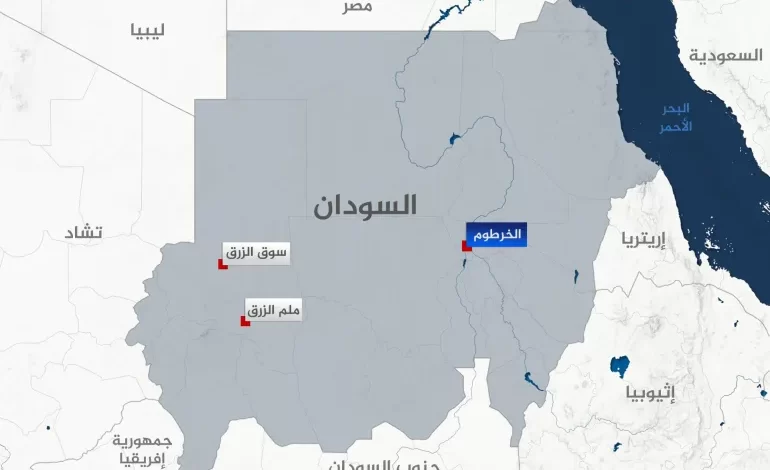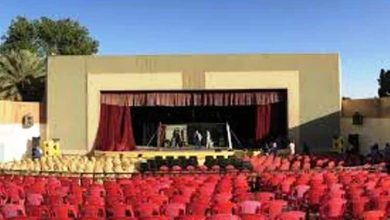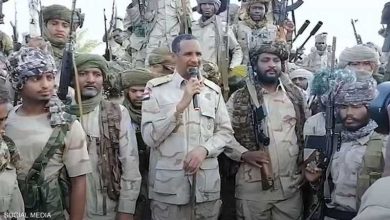Reports
The Army’s Recapture of Al-Zurq Base in Darfur: A Strategic Turning Point in the War

Sudan Events – Agencies
The Sudanese army and allied joint forces have seized the Al-Zurq military base, located in a remote area of North Darfur within the triangle linking the borders of Sudan, Chad, and Libya.
Since 2017, the Rapid Support Forces (RSF) had established Al-Zurq as a key base, constructing extensive infrastructure including schools, hospitals, training camps, fuel depots, large ammunition stockpiles, and significant military equipment. The base also featured a military airstrip used for resupplying and transporting equipment to numerous makeshift airstrips in areas like Um Badir and Hamrat Al-Sheikh in North Kordofan.
After the war erupted on April 15, 2023, Al-Zurq became one of the primary hubs receiving supplies for the RSF via Chad and Libya. Over the past months, the Sudanese Air Force repeatedly bombed the base in efforts to disrupt RSF supplies.
Darfur Region Governor Minni Arko Minnawi told Sudan Tribune: “The joint forces fought fierce battles in North Darfur lasting five hours, resulting in the removal of all RSF fortifications protecting Al-Zurq base.”
He added, “The RSF has now lost a critical supply line connecting it to Libya.”
Fierce Battles
Videos showed joint force personnel displaying an armored vehicle, with reports suggesting the seizure of large quantities of military equipment, including 90 combat vehicles—30 of which were armored—indicating the presence of senior commanders, as armored vehicles are typically assigned to leaders.
The Sudanese Air Force played a significant role in the intense clashes, bombing RSF targets with barrel bombs, according to military sources.
The battles in North Darfur’s desert are a continuation of the violent confrontations in El-Fashir since May between the army and allied armed groups on one side, and the RSF on the other.
Attempts by the RSF to retake Al-Zurq failed despite significant reinforcements from surrounding areas, including Kutum, Mellit, Kabkabiya, Saraf Omra, Jebel Amer, and Al-Qibah.
While the RSF announced in a statement the following day that it had retaken the area, subsequent reports contradicted this claim.
A Strategic Shift
Many war analysts in Sudan view the army’s recapture of Al-Zurq as a strategic turning point in the war, potentially leading to a collapse in RSF leadership and command structures, thereby hastening the conflict’s end.
Al-Zurq served as the primary supply base for RSF logistics from Libya and Chad, making its loss a significant logistical and psychological blow.
Beyond its strategic importance, Al-Zurq holds social significance as the stronghold of the Dagalo family. It houses their properties and tribal authority, represented by Jum’a Dagalo, uncle of RSF leader Mohamed Hamdan Dagalo (Hemeti).
Efforts by the RSF to reclaim the base are expected to intensify. Pro-RSF groups on social media have launched calls for mobilization to retake Al-Zurq. Failure to do so could lead to widespread collapses in other locations, as Al-Zurq is seen as a domino whose fall could trigger further setbacks.
The recapture of Al-Zurq is likely to allow the army and allied forces to advance toward reclaiming the capitals of Darfur’s states, including Geneina, Zalingei, Nyala, and Ed Daein—especially if U.S. efforts succeed in curbing RSF supply flows from supporting nations.
Moreover, it eases the pressure on El-Fashir, which has been besieged by RSF forces since May. Al-Zurq was the primary logistical and manpower supply hub for the RSF forces surrounding El-Fashir, the only capital of Darfur’s five states still outside RSF control.
The fall of Al-Zurq may force RSF forces to withdraw from various locations in North Kordofan, Gezira, and White Nile, in a bid to concentrate efforts on recapturing the base. This would accelerate the army’s control over these evacuated areas, especially in Gezira and its capital, Medani, which the army has encircled.
Source: Al Jazeera Net



